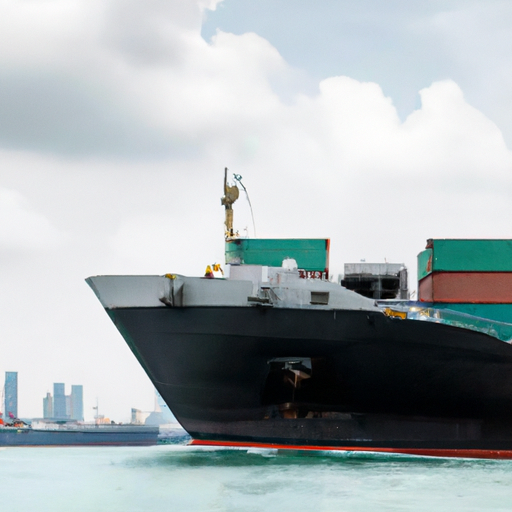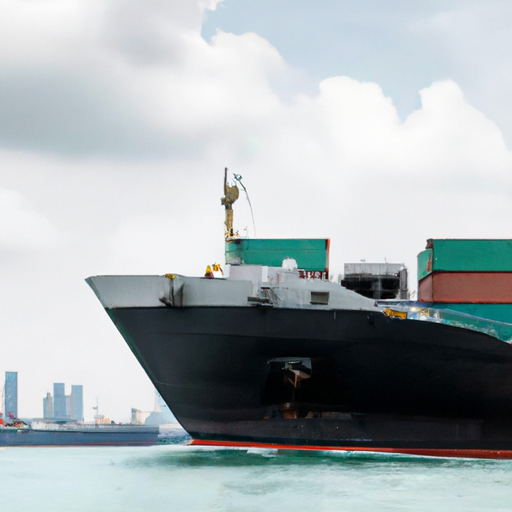
In this article, we will discuss some important things that you should avoid while visiting a port. By the end, you will have a better understanding of the potential pitfalls and how to navigate them. We’ll cover topics such as safety precautions, tourist scams, and cultural sensitivities. So, if you’re planning a trip to a port, keep reading to ensure a smooth and enjoyable experience.

Understanding Port
Definition of Port
A port is a designated area along a body of water, such as a river or a coastline, that serves as a point of entry or departure for ships and boats. It is a crucial part of the transportation infrastructure, facilitating the movement of goods and passengers between land and water. Ports typically consist of various facilities and services, including docks, terminals, piers, warehouses, and customs offices.
History of Port
The origins of ports can be traced back to ancient times when coastal areas were used as natural harbors for trade and strategic purposes. As civilizations flourished and maritime trade became more prevalent, the need for structured port facilities and regulations arose. Throughout history, ports played a pivotal role in facilitating cultural exchange, economic growth, and military operations.
Characteristics of Port
Ports exhibit several distinct characteristics that set them apart from other transportation hubs. Firstly, ports are often located near major urban centers or industrial zones to facilitate the transportation of goods and support international trade. Secondly, ports have diverse infrastructure, including navigational aids, storage facilities, and specialized equipment for handling cargo. Lastly, ports have a complex network of stakeholders, including shipping companies, freight forwarders, customs authorities, and port authorities.
The Importance of Port
Economic Significance of Ports
Ports are vital contributors to a nation’s economy. They serve as gateways for imports and exports, enabling trade and commerce on a global scale. The economic impact of ports extends beyond their immediate vicinity, as they generate employment opportunities, attract investment, and stimulate economic growth in surrounding regions. Successful port operations can lead to the development of industrial clusters, the establishment of free trade zones, and increased foreign direct investment.
Role of Ports in International Trade
In an increasingly interconnected world, ports play a crucial role in facilitating international trade. They serve as strategic hubs for the movement of goods between countries, facilitating imports and exports. Ports also support supply chains by providing storage, handling, and distribution services. Efficient port operations contribute to the overall competitiveness of nations in the global marketplace.
Port Infrastructure Development
To meet the growing demands of international trade, ports must continuously invest in infrastructure development. This includes expanding port facilities, deepening and widening navigation channels, and modernizing cargo handling equipment. Adequate port infrastructure not only improves efficiency but also enhances safety and security measures. Port authorities must collaborate with relevant stakeholders to develop comprehensive master plans and implement sustainable infrastructure projects.
Common Challenges in Ports
Congestion and Port Delays
One of the most significant challenges faced by ports is congestion, which occurs when there is a high volume of cargo and vessels that exceed the port’s capacity. Congestion leads to delays in vessel arrivals, berthing, and cargo discharge. It disrupts supply chains, increases costs, and hinders economic growth. Ports must employ effective traffic management strategies, optimize berthing processes, and invest in technology to alleviate congestion and reduce waiting times.
Environmental Impact of Ports
Ports have a considerable environmental footprint due to their operations, including air and water pollution, noise pollution, and habitat destruction. These impacts can harm ecosystems, degrade air quality, and pose health risks to nearby communities. To mitigate the environmental impact, ports must adopt sustainable practices, such as using clean energy sources, implementing waste management systems, and implementing emission-reducing technologies. Collaboration with environmental agencies and local communities is essential to ensure responsible port operations.
Security Concerns in Ports
Ports are vulnerable to various security threats, including terrorism, smuggling, piracy, and illegal immigration. These security concerns pose risks to the safety of port personnel, cargo, and the general public. Ports must invest in robust security infrastructure, such as surveillance systems, access control measures, and cybersecurity protocols. Collaboration between port authorities, national security agencies, and international organizations is crucial to effectively address security challenges.
Things to Avoid in Port Operations
Inefficient Cargo Handling Practices
Inefficient cargo handling practices can lead to delays, damage to goods, and increased costs. It is essential to prioritize effective cargo management, including optimizing container stacking, employing proper lifting techniques, and implementing efficient loading and unloading procedures. Investing in modern cargo handling equipment and training the workforce on best practices can significantly improve efficiency and productivity in port operations.
Lack of Proper Maintenance
Neglecting regular maintenance of port infrastructure and equipment can result in decreased reliability, increased downtime, and safety hazards. Ports should establish proper maintenance procedures, conduct routine inspections, and promptly address any identified issues. Proactive maintenance practices, such as repairing or replacing aging equipment and infrastructure, can prevent costly breakdowns and ensure optimal operational performance.
Failure to Comply with Safety Regulations
Non-compliance with safety regulations can have severe consequences for port operations. Safety standards govern various aspects of port activities, including vessel operations, cargo handling, and occupational health and safety. Ports must prioritize safety training and awareness programs, enforce adherence to regulations, and conduct regular safety audits. Establishing a culture of safety and accountability is essential to avoid accidents, injuries, and legal liabilities.
Avoidable Mistakes in Port Management
Insufficient Planning and Forecasting
Lack of proper planning and forecasting can lead to inefficiencies, inadequate resource allocation, and unexpected disruptions. Port authorities must engage in strategic planning exercises that consider future demand projections, technological advancements, and changes in international trade patterns. Accurate forecasting and contingency planning enable ports to proactively address challenges and capitalize on emerging opportunities.
Inadequate Workforce Training
The workforce plays a pivotal role in the success of port operations. Insufficient training and lack of skill development can hinder productivity and compromise safety standards. Port authorities must invest in comprehensive training programs that equip employees with the necessary knowledge and skills to perform their roles effectively. Continuous learning and professional development opportunities are vital for maintaining a competent and motivated workforce.
Inaccurate Documentation and Logistics
Accurate and efficient documentation and logistics are crucial for smooth port operations. Errors or delays in paperwork and logistics processes can result in disruptions, cargo losses, and financial penalties. Ports must establish robust systems for documentation management, implement digitization initiatives, and ensure seamless integration with relevant stakeholders. Leveraging technology, such as electronic data interchange (EDI), can streamline documentation and logistics processes, reducing errors and delays.
Negative Effects of Avoidable Practices
Increased Costs and Losses
Failure to address avoidable practices in port operations can lead to increased costs and financial losses. Inefficiencies, delays, and disruptions increase operational expenses, impact profit margins, and erode the overall competitiveness of ports. By implementing best practices and avoiding common pitfalls, ports can enhance cost-effectiveness, optimize resource allocation, and improve financial sustainability.
Decreased Efficiency and Productivity
Avoidable practices can hinder the efficiency and productivity of port operations. Inefficient cargo handling, inadequate maintenance, and non-compliance with safety regulations result in delays, inefficient use of resources, and decreased throughput capacity. By implementing effective management strategies and investing in infrastructure upgrades, ports can optimize efficiency, increase productivity, and enhance customer satisfaction.
Negative Reputation and Customer Dissatisfaction
Poor port management practices can significantly damage a port’s reputation and lead to customer dissatisfaction. Delays, cargo damage, and security issues can erode trust and discourage shipping companies and freight forwarders from utilizing a particular port. By prioritizing customer-centric approaches, implementing transparent communication channels, and consistently delivering high-quality services, ports can build a positive reputation, attract business, and foster long-term partnerships.
Best Practices for Port Operations
Optimizing Cargo Handling Processes
Efficient cargo handling is critical for port operations. Ports should invest in state-of-the-art cargo handling equipment, such as cranes, forklifts, and straddle carriers, to improve productivity and minimize risks. Embracing automation and smart technologies, such as container tracking systems and robotic palletizers, can significantly enhance cargo handling operations. Regular training and skill development programs for the workforce also contribute to optimizing cargo handling processes.
Implementing Regular Maintenance and Upgrades
Regular maintenance and upgrades are essential to ensure the reliability and safety of port infrastructure. Ports should establish preventive maintenance programs that cover all key assets, including berths, cranes, warehouses, and terminal operating systems. Utilizing advanced monitoring technologies, such as sensors and drones, can enable predictive maintenance, allowing ports to address maintenance needs proactively. Continuous upgrades and modernization initiatives should also be prioritized to keep up with technological advancements and industry standards.
Ensuring Compliance with Safety Standards
Safety should be a top priority for port operations. Ports should establish comprehensive safety management systems that encompass all aspects of port activities. Regular safety audits, training programs, and rigorous adherence to safety regulations can minimize risks and prevent accidents. Involving employees in safety initiatives and fostering a culture of safety awareness contribute to a safe and productive working environment.
Strategies for Effective Port Management
Advanced Planning and Forecasting Techniques
To stay ahead in the dynamic maritime industry, ports must employ advanced planning and forecasting techniques. This includes analyzing historical data, utilizing predictive models, and collaborating with stakeholders to identify emerging trends and potential challenges. Advanced planning enables ports to allocate resources effectively, optimize operations, and manage risks proactively. Embracing digital tools and analytics can enhance planning and forecasting accuracy, supporting strategic decision-making.
Investing in Workforce Development and Training
A skilled and motivated workforce is crucial for effective port management. Ports should invest in ongoing workforce development programs that enhance technical skills, managerial competencies, and industry-specific knowledge. Training initiatives should align with emerging technologies, industry best practices, and changing regulatory requirements. Encouraging employee engagement, promoting career growth opportunities, and fostering a positive work environment contribute to a highly productive and resilient workforce.
Efficient Documentation and Supply Chain Integration
Smooth documentation and seamless supply chain integration are paramount for efficient port management. Ports should prioritize digitalization initiatives, such as electronic data interchange (EDI) systems, to streamline documentation processes and eliminate paperwork-related delays. Collaborating with shipping lines, customs authorities, and other stakeholders to establish integrated supply chain platforms enhances transparency, facilitates information sharing, and reduces administrative burdens.
Continuous Improvement in Port Operations
Embracing Technological Innovations
To stay competitive in a rapidly evolving industry, ports must embrace technological innovations. Digitalization, automation, and the Internet of Things (IoT) offer opportunities to optimize port operations, enhance efficiency, and improve service quality. Ports should explore technologies such as blockchain for secure and transparent documentation, artificial intelligence for predictive maintenance, and cloud computing for data management. Embracing innovation enables ports to remain agile, adapt to changing market dynamics, and meet customer expectations.
Monitoring Key Performance Indicators
Monitoring key performance indicators (KPIs) is essential for measuring and improving port operations. Ports should identify relevant KPIs, such as vessel turnaround time, berth occupancy, and cargo throughput, to assess performance and identify areas for improvement. Real-time data collection and analysis facilitate proactive decision-making, highlighting areas that require attention and enabling corrective actions to be taken promptly.
Seeking Feedback from Stakeholders
Engaging with stakeholders and actively seeking feedback is crucial for continuous improvement in port operations. Ports should establish regular communication channels with shipping lines, freight forwarders, and other customers to understand their needs, expectations, and concerns. Feedback can be gathered through surveys, customer meetings, and industry forums. Acting upon feedback demonstrates a commitment to delivering quality services and fosters a collaborative and mutually beneficial relationship with stakeholders.
Conclusion
It is essential for ports to avoid common pitfalls and adopt best practices to ensure efficient and sustainable operations. Inefficient cargo handling practices, lack of maintenance, and failure to comply with safety regulations can lead to increased costs, decreased efficiency, and negative reputation. By optimizing cargo handling processes, implementing regular maintenance and upgrades, and ensuring compliance with safety standards, ports can enhance efficiency, productivity, and customer satisfaction. Furthermore, continuous improvement initiatives, such as embracing technological innovations, monitoring key performance indicators, and seeking feedback from stakeholders, enable ports to stay ahead in a dynamic and competitive industry. By avoiding avoidable practices and implementing best practices, ports can overcome challenges, capitalize on opportunities, and contribute to the growth and development of global trade.



